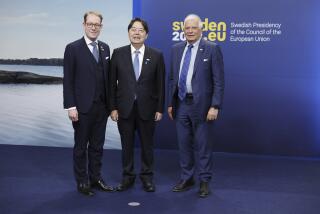Japan Raises Rights Issue With China : Diplomacy: Miyazawa voices concerns to visiting Communist Party chief. He gets the standard response.
- Share via
TOKYO — Prime Minister Kiichi Miyazawa told visiting Chinese Communist Party Chief Jiang Zemin on Monday that not only the United States but Japan itself is concerned about China’s human rights abuses.
“As China grows into a superpower, you inevitably will have to confront this problem. Japan is also concerned about this problem,” Miyazawa said. The frank statement, delivered during a 2 1/2-hour meeting, marked one of the rare occasions on which a Japanese leader has spoken out against Chinese suppression of dissent without framing the remarks in the context of China’s relations with the United States.
Jiang, nonetheless, offered only the standard Chinese response.
China believes that “the right of survival--the feeding of 1.16 billion persons” is more important than political rights, Japanese officials briefing reporters quoted Jiang as replying. Any foreign comment about human rights constitutes “interference in domestic affairs, which China will not accept,” Jiang added.
“Human rights should not be linked to relations between two nations,” he said.
Jiang is here to launch a series of mutual visits to commemorate the 20th anniversary of Japanese-Chinese relations, and his meeting with Miyazawa underscored a growing frankness but also continuing differences between the two Asian giants.
Miyazawa offered a pledge of continuing support from Japan, China’s No. 1 aid donor, for Beijing’s economic reforms. He added that discussions within the Japanese government will “produce a good result in the near future” on loans for 18 coal- and oil-development projects in China worth 700 billion yen ($5.3 billion).
But once again, Jiang turned a deaf ear to Miyazawa’s reiteration of Japan’s pledge to refrain from becoming a military giant and to forgo development of nuclear weapons. Instead, he urged Japan to refrain from dispatching armed forces overseas to participate in disaster relief or U.N.-sponsored peacekeeping activities.
He made the statement after Miyazawa asked for China’s “understanding” of a bill to permit such troop dispatches. It is now being debated in the upper house of Parliament.
For future Chinese-Japanese relations, “China must forget the past and look to the future. Japan must earnestly examine the historical facts of the past and hold steadfastly to the path of peaceful development,” Jiang declared, referring to Japanese wartime aggression against China.
But when pressed by Miyazawa to join international efforts to regulate sales of weaponry and reduce military armaments, Jiang demurred. He said any weapons controls must recognize the “rights” of “middle-level” military powers like China.
Neither leader mentioned the fact that China possesses nuclear weapons.
Miyazawa, for his part, dodged a request from Jiang that Japan send Emperor Akihito and Empress Michiko to visit China this year as part of the 20th-anniversary celebrations. He said only that the government is “seriously studying” China’s repeated invitation to the imperial couple.
Conservative members of Miyazawa’s ruling Liberal Democratic Party started speaking out against a visit to China by the imperial couple after China enacted a territorial law incorporating islands that Japan claims to be part of its territory and gave the go-ahead to Chinese citizens to press private claims against Japan for some 24 trillion yen ($180 billion) in wartime damages against Japan.
On a governmental level, China abandoned claims to wartime reparations when the two countries established diplomatic relations in September, 1972.
Jiang and Miyazawa agreed only to refrain from discussing the intractable territorial dispute over what are called the Senkaku Islands by Japan and the Diaoyutai Islands by the Chinese. Although uninhabited, the islands are surrounded by rich fishing grounds. Oil deposits also are believed to exist under the ocean bed.
The two leaders, however, did agree to work together for peace in Cambodia and to seek a Korean Peninsula free of nuclear weapons.
After Miyazawa declared that Japan regards suspected North Korean development of nuclear weapons as a threat to its security, Jiang said China will make “another approach” to its ally. He did not spell out what he had in mind.
Although North Korea has signed the Nuclear Non-Proliferation Treaty as well as a separate agreement with South Korea to keep the peninsula free of nuclear arms, it has refused to permit inspections of its nuclear facilities.
More to Read
Sign up for Essential California
The most important California stories and recommendations in your inbox every morning.
You may occasionally receive promotional content from the Los Angeles Times.












